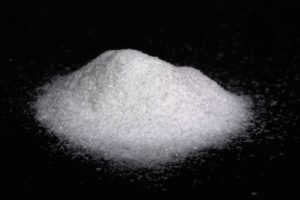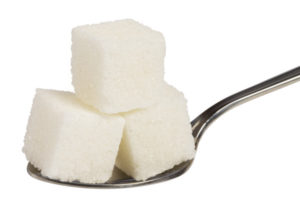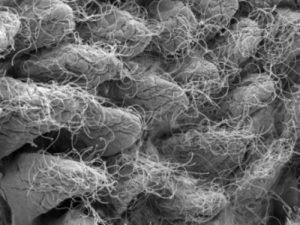 What things in our environment have an effect on the microbes living within us? We now know that gut microbes are important for our health in many ways, and that thousands of species of bacteria, as well as viruses, fungi, and other microbes normally live in a healthy person's gut. We refer to these microbes as the human microbiota or human microbiome. When the community of gut microbes is thrown out of whack (dysbiosis) there can be a number of negative health effects, including diseases. Researchers are just learning about all the microbes within us and their importance in health and disease. [See all posts on the human microbiome.]
What things in our environment have an effect on the microbes living within us? We now know that gut microbes are important for our health in many ways, and that thousands of species of bacteria, as well as viruses, fungi, and other microbes normally live in a healthy person's gut. We refer to these microbes as the human microbiota or human microbiome. When the community of gut microbes is thrown out of whack (dysbiosis) there can be a number of negative health effects, including diseases. Researchers are just learning about all the microbes within us and their importance in health and disease. [See all posts on the human microbiome.]
Past posts have discussed such things as antibiotics, emulsifiers, different foods and diets, heartburn drugs, etc. having an effect on the human microbiome, but what else? A recent study from China reviewed some environmental pollutants and their effects on gut microbiota - as shown in both human and animal studies. They reviewed studies on antibiotics, heavy metals (arsenic, cadmium, lead), persistant organic pollutants or POPs (organochlorine pesticides, polychlorinated biphenyls (PCBs), polybrominated diphenyl ethers, and polycyclic aromatic hydrocarbons or PAHs), pesticides (permethrin, chlorpyrifos, pentachlorophenol, epoxiconazole and carbendazim, imazalil), emulsifiers, nanoparticles (e.g., silver nanoparticles), and artificial sweeteners. They found that all these environmental pollutants had effects on gut microbes - with some effects lasting for years. Their conclusion: gut microbes are very sensitive to drugs, diet, and environmental pollutants. By the way, notice that popular food ingredients such as emulsifiers and artificial sweeteners were considered "environmental pollutants" by the researchers.
Excerpts from Environmental Pollution: Effects of environmental pollutants on gut microbiota
Environmental pollutants have become an increasingly common health hazard in the last several decades. Recently, a number of studies have demonstrated the profound relationship between gut microbiota and our health. Gut microbiota are very sensitive to drugs, diet, and even environmental pollutants. In this review, we discuss the possible effects of environmental pollutants including antibiotics, heavy metals, persistent organic pollutants, pesticides, nanomaterials, and food additives on gut microbiota and their subsequent effects on health. We emphasize that gut microbiota are also essential for the toxicity evaluation of environmental pollution. In the future, more studies should focus on the relationship between environmental pollution, gut microbiota, and human health.
Thousands of species are found in the gut microbiome, and the majority of these species belong to six bacterial phyla: Firmicutes, Bacteroidetes, Actinobacteria, Proteobacteria, Fusobacteria, and Verrucomicrobia (Eckburg et al., 2005). Gut microbiota are highly dynamic and have substantial interindividual and intraindividual variation....The gut microbiota are very essential for host health. They participate in the regulation of many physiological functions. The gut microbiota reside in our intestinal mucus layer and even participate in shaping the mucus layer (Jakobsson et al., 2015). They help us to digest food (such as fiber); synthesize vitamins and amino acids (Spanogiannopoulos et al., 2016); play very important roles in energy metabolism and storage, immune system modulation, growth, and neurodevelopment; and can even regulate our behavior.... The occurrence of many diseases is correlated with altered gut microbiome composition (Lange et al., 2016). Gut microbiota dysbiosis is considered to be a potential cause of obesity (Cani et al., 2007; Fei and Zhao, 2013). However, gut microbiota are very sensitive to drugs, diet, and environmental pollutants.
Although most environmental pollutants do not directly target gut microbiota, some pollutants can enter the body and interact with the gut microbiota through different pathways. A number of previous studies have shown that exposure to environmental pollutants can alter the composition of the gut microbiome, leading to disorders of energy metabolism, nutrient absorption, and immune system function or the production of other toxic symptoms (Jin et al., 2015c; Zhang et al., 2015b). In the present review, we conclude that different kinds of environmental pollutants can induce gut microbiota dysbiosis and have multiple potential adverse effects on animal health.
Heavy metals in the environment have become a severe health risk in recent years (Liu et al., 2016a). As a common form of environmental pollution, heavy metals are associated with a wide range of toxic effects, including carcinogenesis, oxidative stress, and DNA damage, and effects on the immune system..... Recently, several studies have stated that heavy metal exposure could also lead to gut microbiota dysbiosis, indicating that study of gut microbiota provides a new approach to analyze the mechanisms of heavy metal toxicity
Immune system function is tightly coupled to our gut microbiome. Gut microbiota and their metabolites can interact with both the innate immune system and the adaptive immune system (Honda and Littman, 2016; Thaiss et al., 2016).... Alterations in the gut microbiome can disrupt the balance between the host immune system and gut microbiota, induce immune responses, and even trigger some immunological diseases. Furthermore, immune system imbalance may influence the microbiota metabolites. For example, trimethylamine, which is absorbed from food by gut microbiota, can induce atherosclerosis (Chistiakov et al., 2015).
 For years I heard health care providers recommend to persons worried about or with type 2 diabetes to only consume water, unsweetened coffee or tea, or zero calorie artificially sweetened beverages, including soda. Well, it turns out that artificial sweeteners have all sorts of harmful health effects, with different sweeteners (e.g., erythritol) having different effects.
For years I heard health care providers recommend to persons worried about or with type 2 diabetes to only consume water, unsweetened coffee or tea, or zero calorie artificially sweetened beverages, including soda. Well, it turns out that artificial sweeteners have all sorts of harmful health effects, with different sweeteners (e.g., erythritol) having different effects.
 The artificial sweetener erythritol is added to many foods. However, this sugar substitute (which is often blended with stevia) may cause health problems . A recent small
The artificial sweetener erythritol is added to many foods. However, this sugar substitute (which is often blended with stevia) may cause health problems . A recent small 
 What things in our environment have an effect on the microbes living within us? We now know that gut microbes are important for our health in many ways, and that
What things in our environment have an effect on the microbes living within us? We now know that gut microbes are important for our health in many ways, and that  Bottom line: Try to avoid artificial sweeteners!
Bottom line: Try to avoid artificial sweeteners! This image depicts gut microbiota.
This image depicts gut microbiota.